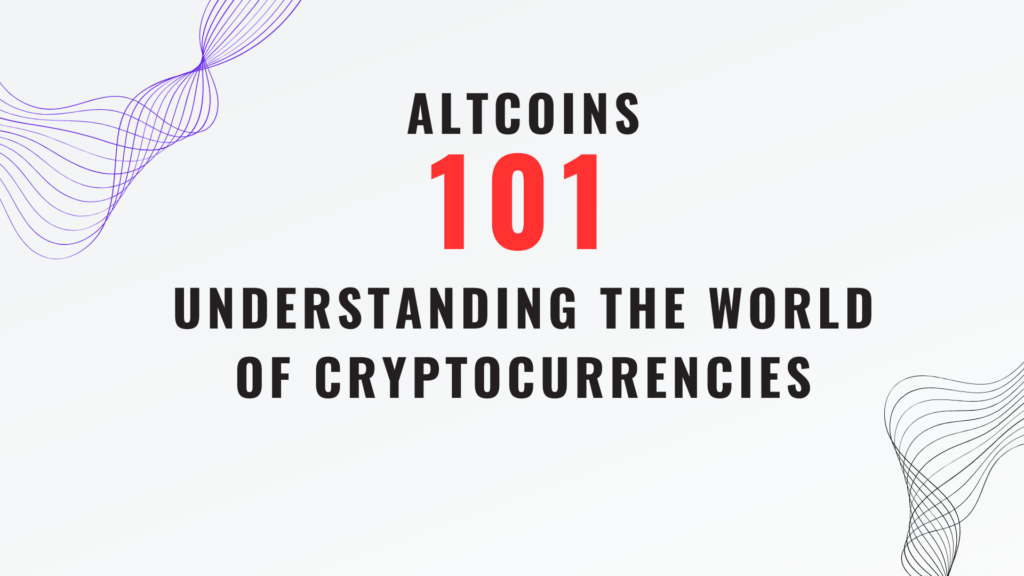In the ever-evolving landscape of digital finance, cryptocurrencies have taken the world by storm. Bitcoin, the pioneer of this new financial frontier, has paved the way for a plethora of alternative digital currencies, commonly referred to as “altcoins.” These altcoins offer unique features, use cases, and investment opportunities, making them an intriguing aspect of the cryptocurrency ecosystem. In this article, we will delve into Altcoins 101, providing you with a comprehensive understanding of what altcoins are, their purpose, and how they fit into the broader world of cryptocurrencies.
What Are Altcoins?
The term “altcoin” is a portmanteau of “alternative” and “coin,” and it is used to describe any cryptocurrency other than Bitcoin. While Bitcoin remains the most recognized and widely adopted cryptocurrency, there are thousands of altcoins in existence, each with its own set of characteristics and functions.
Altcoins were created to address certain limitations or shortcomings of Bitcoin. These limitations could be related to scalability, speed of transactions, privacy features, or even governance structures. As a result, altcoins come in various shapes and sizes, each attempting to improve upon specific aspects of the cryptocurrency experience.
Why Do Altcoins Exist?
1. **Diversification:** One of the primary reasons people invest in altcoins is diversification. Bitcoin, while revolutionary, is not immune to volatility. Altcoins offer investors an opportunity to spread their risk across different assets, potentially minimizing the impact of a downturn in one particular cryptocurrency.
2. **Innovation:** Altcoins often serve as testbeds for new ideas and technologies. Developers use them to experiment with novel consensus mechanisms, smart contract platforms, and privacy features. Some of these innovations eventually find their way into Bitcoin or inspire new projects.
3. **Use Cases:** Many altcoins are designed for specific use cases. For example, Ethereum is known for its smart contract capabilities, while privacy-focused coins like Monero and Zcash offer enhanced anonymity features. These altcoins cater to users with unique needs beyond basic digital currency use.
4. **Community and Governance:** Altcoins often have dedicated communities that drive their development and adoption. These communities can implement changes more quickly and flexibly than larger networks like Bitcoin.
Types of Altcoins
Altcoins can be categorized into several types based on their underlying technology, purpose, and features:
1. **Forked Coins:** These are altcoins that were created by forking (splitting) an existing blockchain, often Bitcoin. Examples include Bitcoin Cash (BCH) and Bitcoin SV (BSV).
2. **Smart Contract Platforms:** Ethereum is the pioneer in this category, but others like Binance Smart Chain (BNB), Cardano (ADA), and Solana (SOL) have emerged, allowing developers to build decentralized applications (dApps).
3. **Privacy Coins:** These focus on enhancing the anonymity and privacy of transactions. Notable examples are Monero (XMR) and Zcash (ZEC).
4. **Stablecoins:** These are cryptocurrencies designed to maintain a stable value, often pegged to a fiat currency like the US Dollar. Tether (USDT) and USD Coin (USDC) are well-known stablecoins.
5. **Utility Tokens:** These are tokens specific to a particular platform or application. For instance, Chainlink (LINK) is used to facilitate data transfers between smart contracts.
Risks and Considerations
While altcoins offer exciting opportunities, they also come with risks. Here are some factors to consider:
1. **Volatility:** Altcoins can be highly volatile, with prices subject to rapid fluctuations. This volatility can lead to significant gains but also substantial losses.
2. **Regulatory Concerns:** Cryptocurrency regulations vary by country and are continually evolving. Altcoin investors should stay informed about regulatory developments in their jurisdiction.
3. **Security:** Not all altcoin projects are equally secure. Some may be vulnerable to hacks or technical flaws. Conduct thorough research before investing.
4. **Market Saturation:** With thousands of altcoins in existence, it can be challenging to identify projects with real value and potential. Many altcoins are speculative in nature.
In Summary
Altcoins have transformed the cryptocurrency landscape, offering investors and developers a wide array of options beyond Bitcoin. Understanding the purpose, types, and risks associated with altcoins is crucial for anyone looking to explore this fascinating realm of digital finance. As with any investment, conducting due diligence and staying informed are essential practices in the world of altcoins. Whether you’re interested in diversifying your portfolio, exploring innovative technologies, or supporting specific use cases, altcoins have something to offer in the ever-evolving world of cryptocurrencies.
Claim a 20% Discount on Your first Trading bot Purchase here



